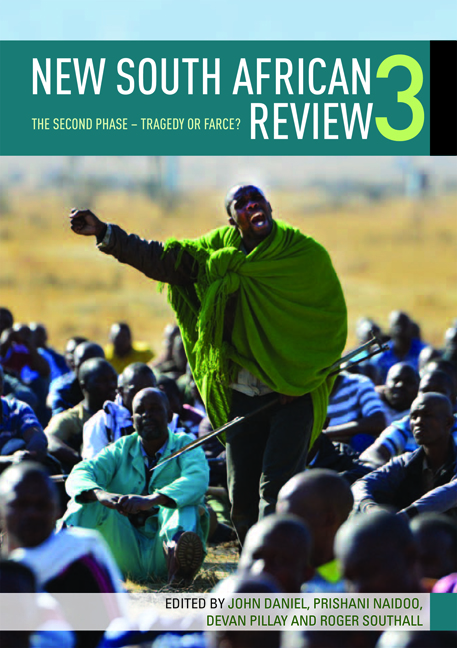Book contents
- Frontmatter
- Contents
- Preface
- Introduction: The second phase – tragedy or farce?
- PART 1 Party, Power and Class
- PART 2 Ecology, Economy and Labour
- PART THREE Public Policy and Social Practice
- PART 4 South Africa at Large
- Introduction: South Africa at large
- Chapter 15 South Africa and the BRIC: Punching above its weight?
- Chapter 16 The Swazi Nation, the Swazi government and the South African connection
- Contributors
- Index
Introduction: South Africa at large
from PART 4 - South Africa at Large
Published online by Cambridge University Press: 31 May 2019
- Frontmatter
- Contents
- Preface
- Introduction: The second phase – tragedy or farce?
- PART 1 Party, Power and Class
- PART 2 Ecology, Economy and Labour
- PART THREE Public Policy and Social Practice
- PART 4 South Africa at Large
- Introduction: South Africa at large
- Chapter 15 South Africa and the BRIC: Punching above its weight?
- Chapter 16 The Swazi Nation, the Swazi government and the South African connection
- Contributors
- Index
Summary
Under the presidency of Nelson Mandela, South African foreign policy sought, for the most part, to assume a high moral ground, refashioning itself after the isolation and ignominy of the late-apartheid years by adopting adherence to human rights and international law as its basis. Following clashes with African states over human rights issues (and the criticisms of their domestic policies that this implied or activated), his successor, Thabo Mbeki, opted for a more pragmatic approach combined with a reformist pan-Africanist agenda embodied in the launch of the New Partnership for African Development (Nepad). Subsequently, under Jacob Zuma, South African foreign policy has sought to extend its outreach globally and continentally while consolidating its linkages regionally.
The two chapters that conclude this volume highlight both dimensions of foreign policy under the Zuma presidency: first in Sanusha Naidu's exploration of South Africa's admission into the grouping of ‘emergent’ economies known as the BRIC (Brazil, Russia, India and China); and, second, by an analysis of relations between the governments of Swaziland and South Africa by John Daniel and Marisha Ramdeen.
Naidu describes the invitation to South Africa to join the BRIC club in December 2010 as a diplomatic coup on the part of the Zuma presidency, a signifier of South Africa's high profile in various international forums as a representative of the global South. However, South Africa's admission as the fifth member country of BRIC was greeted with ambivalence, some arguing that it confirmed the country's status as an influential player globally, others that South Africa had been admitted more for political than economic reasons, noting especially that economically it was dwarfed by the other member countries. Naidu asks what implications joining the BRIC has for South Africa's foreign policy, and whether it marks a culmination of Mbeki's developmental and internationally reformist agenda.
Naidu depicts Zuma's foreign policy as combining elements of Mandela's human rights agenda with an attempt to smooth relations that had been ruffled by Mbeki regionally, notably with Angola, but she sees continuity with Mbeki's goal of strengthening South Africa's position continentally and globally, inclusive of pursuit of greater inclusion of the global South within multilateral forums and notably within international financial institutions.
- Type
- Chapter
- Information
- New South African Review 3The second phase - Tragedy or Farce?, pp. 294 - 296Publisher: Wits University PressPrint publication year: 2013



